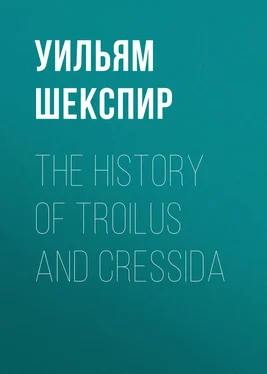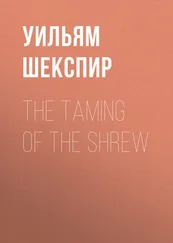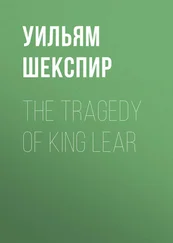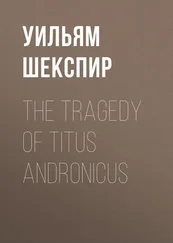Уильям Шекспир - The History of Troilus and Cressida
Здесь есть возможность читать онлайн «Уильям Шекспир - The History of Troilus and Cressida» — ознакомительный отрывок электронной книги совершенно бесплатно, а после прочтения отрывка купить полную версию. В некоторых случаях можно слушать аудио, скачать через торрент в формате fb2 и присутствует краткое содержание. Жанр: Европейская старинная литература, Драматургия, foreign_dramaturgy, на английском языке. Описание произведения, (предисловие) а так же отзывы посетителей доступны на портале библиотеки ЛибКат.
- Название:The History of Troilus and Cressida
- Автор:
- Жанр:
- Год:неизвестен
- ISBN:нет данных
- Рейтинг книги:5 / 5. Голосов: 1
-
Избранное:Добавить в избранное
- Отзывы:
-
Ваша оценка:
- 100
- 1
- 2
- 3
- 4
- 5
The History of Troilus and Cressida: краткое содержание, описание и аннотация
Предлагаем к чтению аннотацию, описание, краткое содержание или предисловие (зависит от того, что написал сам автор книги «The History of Troilus and Cressida»). Если вы не нашли необходимую информацию о книге — напишите в комментариях, мы постараемся отыскать её.
The History of Troilus and Cressida — читать онлайн ознакомительный отрывок
Ниже представлен текст книги, разбитый по страницам. Система сохранения места последней прочитанной страницы, позволяет с удобством читать онлайн бесплатно книгу «The History of Troilus and Cressida», без необходимости каждый раз заново искать на чём Вы остановились. Поставьте закладку, и сможете в любой момент перейти на страницу, на которой закончили чтение.
Интервал:
Закладка:
AENEAS passes
CRESSIDA. Speak not so loud.
PANDARUS. That's Aeneas. Is not that a brave man? He's one of
the
flowers of Troy, I can tell you. But mark Troilus; you shall
see
anon.
ANTENOR passes
CRESSIDA. Who's that?
PANDARUS. That's Antenor. He has a shrewd wit, I can tell you;
and
he's a man good enough; he's one o' th' soundest judgments in
Troy, whosoever, and a proper man of person. When comes
Troilus?
I'll show you Troilus anon. If he see me, you shall see him
nod
at me.
CRESSIDA. Will he give you the nod?
PANDARUS. You shall see.
CRESSIDA. If he do, the rich shall have more.
HECTOR passes
PANDARUS. That's Hector, that, that, look you, that; there's a
fellow! Go thy way, Hector! There's a brave man, niece. O
brave
Hector! Look how he looks. There's a countenance! Is't not a
brave man?
CRESSIDA. O, a brave man!
PANDARUS. Is 'a not? It does a man's heart good. Look you what
hacks are on his helmet! Look you yonder, do you see? Look
you
there. There's no jesting; there's laying on; take't off who
will, as they say. There be hacks.
CRESSIDA. Be those with swords?
PANDARUS. Swords! anything, he cares not; an the devil come to
him,
it's all one. By God's lid, it does one's heart good. Yonder
comes Paris, yonder comes Paris.
PARIS passes
Look ye yonder, niece; is't not a gallant man too, is't not?
Why,
this is brave now. Who said he came hurt home to-day? He's
not
hurt. Why, this will do Helen's heart good now, ha! Would I
could
see Troilus now! You shall see Troilus anon.
HELENUS passes
CRESSIDA. Who's that?
PANDARUS. That's Helenus. I marvel where Troilus is. That's
Helenus. I think he went not forth to-day. That's Helenus.
CRESSIDA. Can Helenus fight, uncle?
PANDARUS. Helenus! no. Yes, he'll fight indifferent well. I
marvel
where Troilus is. Hark! do you not hear the people cry
'Troilus'?
Helenus is a priest.
CRESSIDA. What sneaking fellow comes yonder?
TROILUS passes
PANDARUS. Where? yonder? That's Deiphobus. 'Tis Troilus.
There's a
man, niece. Hem! Brave Troilus, the prince of chivalry!
CRESSIDA. Peace, for shame, peace!
PANDARUS. Mark him; note him. O brave Troilus! Look well upon
him,
niece; look you how his sword is bloodied, and his helm more
hack'd than Hector's; and how he looks, and how he goes! O
admirable youth! he never saw three and twenty. Go thy way,
Troilus, go thy way. Had I a sister were a grace or a
daughter a
goddess, he should take his choice. O admirable man! Paris?
Paris
is dirt to him; and, I warrant, Helen, to change, would give
an
eye to boot.
CRESSIDA. Here comes more.
Common soldiers pass
PANDARUS. Asses, fools, dolts! chaff and bran, chaff and bran!
porridge after meat! I could live and die in the eyes of
Troilus.
Ne'er look, ne'er look; the eagles are gone. Crows and daws,
crows and daws! I had rather be such a man as Troilus than
Agamemnon and all Greece.
CRESSIDA. There is amongst the Greeks Achilles, a better man
than
Troilus.
PANDARUS. Achilles? A drayman, a porter, a very camel!
CRESSIDA. Well, well.
PANDARUS. Well, well! Why, have you any discretion? Have you
any
eyes? Do you know what a man is? Is not birth, beauty, good
shape, discourse, manhood, learning, gentleness, virtue,
youth,
liberality, and such like, the spice and salt that season a
man?
CRESSIDA. Ay, a minc'd man; and then to be bak'd with no date
in
the pie, for then the man's date is out.
PANDARUS. You are such a woman! A man knows not at what ward
you
lie.
CRESSIDA. Upon my back, to defend my belly; upon my wit, to
defend
my wiles; upon my secrecy, to defend mine honesty; my mask,
to
defend my beauty; and you, to defend all these; and at all
these
wards I lie at, at a thousand watches.
PANDARUS. Say one of your watches.
CRESSIDA. Nay, I'll watch you for that; and that's one of the
chiefest of them too. If I cannot ward what I would not have
hit,
I can watch you for telling how I took the blow; unless it
swell
past hiding, and then it's past watching
PANDARUS. You are such another!
Enter TROILUS' BOY
BOY. Sir, my lord would instantly speak with you.
PANDARUS. Where?
BOY. At your own house; there he unarms him.
PANDARUS. Good boy, tell him I come. Exit
Boy
I doubt he be hurt. Fare ye well, good niece.
CRESSIDA. Adieu, uncle.
PANDARUS. I will be with you, niece, by and by.
CRESSIDA. To bring, uncle.
PANDARUS. Ay, a token from Troilus.
CRESSIDA. By the same token, you are a bawd.
PANDARUS
Words, vows, gifts, tears, and love's full sacrifice,
He offers in another's enterprise;
But more in Troilus thousand-fold I see
Than in the glass of Pandar's praise may be,
Yet hold I off. Women are angels, wooing:
Things won are done; joy's soul lies in the doing.
That she belov'd knows nought that knows not this:
Men prize the thing ungain'd more than it is.
That she was never yet that ever knew
Love got so sweet as when desire did sue;
Therefore this maxim out of love I teach:
Achievement is command; ungain'd, beseech.
Then though my heart's content firm love doth bear,
Nothing of that shall from mine eyes appear.
Exit
ACT I. SCENE 3. The Grecian camp. Before AGAMEMNON'S tent
Sennet. Enter AGAMEMNON, NESTOR, ULYSSES, DIOMEDES, MENELAUS, and others
AGAMEMNON. Princes,
What grief hath set these jaundies o'er your cheeks?
The ample proposition that hope makes
In all designs begun on earth below
Fails in the promis'd largeness; checks and disasters
Grow in the veins of actions highest rear'd,
As knots, by the conflux of meeting sap,
Infects the sound pine, and diverts his grain
Tortive and errant from his course of growth.
Nor, princes, is it matter new to us
That we come short of our suppose so far
That after seven years' siege yet Troy walls stand;
Sith every action that hath gone before,
Whereof we have record, trial did draw
Bias and thwart, not answering the aim,
And that unbodied figure of the thought
That gave't surmised shape. Why then, you princes,
Do you with cheeks abash'd behold our works
And call them shames, which are, indeed, nought else
But the protractive trials of great Jove
To find persistive constancy in men;
The fineness of which metal is not found
In fortune's love? For then the bold and coward,
The wise and fool, the artist and unread,
The hard and soft, seem all affin'd and kin.
But in the wind and tempest of her frown
Distinction, with a broad and powerful fan,
Puffing at all, winnows the light away;
And what hath mass or matter by itself
Lies rich in virtue and unmingled.
NESTOR. With due observance of thy godlike seat,
Great Agamemnon, Nestor shall apply
Thy latest words. In the reproof of chance
Lies the true proof of men. The sea being smooth,
How many shallow bauble boats dare sail
Upon her patient breast, making their way
With those of nobler bulk!
But let the ruffian Boreas once enrage
The gentle Thetis, and anon behold
The strong-ribb'd bark through liquid mountains cut,
Bounding between the two moist elements
Like Perseus' horse. Where's then the saucy boat,
Whose weak untimber'd sides but even now
Co-rivall'd greatness? Either to harbour fled
Or made a toast for Neptune. Even so
Doth valour's show and valour's worth divide
In storms of fortune; for in her ray and brightness
The herd hath more annoyance by the breeze
Than by the tiger; but when the splitting wind
Makes flexible the knees of knotted oaks,
And flies fled under shade-why, then the thing of courage
As rous'd with rage, with rage doth sympathise,
And with an accent tun'd in self-same key
Retorts to chiding fortune.
ULYSSES. Agamemnon,
Thou great commander, nerve and bone of Greece,
Heart of our numbers, soul and only spirit
In whom the tempers and the minds of all
Should be shut up-hear what Ulysses speaks.
Besides the applause and approbation
The which, [To AGAMEMNON] most mighty, for thy place and
sway,
[To NESTOR] And, thou most reverend, for thy stretch'd-out
life,
I give to both your speeches- which were such
As Agamemnon and the hand of Greece
Should hold up high in brass; and such again
As venerable Nestor, hatch'd in silver,
Should with a bond of air, strong as the axle-tree
On which heaven rides, knit all the Greekish ears
To his experienc'd tongue-yet let it please both,
Thou great, and wise, to hear Ulysses speak.
AGAMEMNON. Speak, Prince of Ithaca; and be't of less expect
That matter needless, of importless burden,
Divide thy lips than we are confident,
When rank Thersites opes his mastic jaws,
We shall hear music, wit, and oracle.
ULYSSES. Troy, yet upon his basis, had been down,
And the great Hector's sword had lack'd a master,
But for these instances:
The specialty of rule hath been neglected;
And look how many Grecian tents do stand
Hollow upon this plain, so many hollow factions.
When that the general is not like the hive,
To whom the foragers shall all repair,
What honey is expected? Degree being vizarded,
Th' unworthiest shows as fairly in the mask.
The heavens themselves, the planets, and this centre,
Observe degree, priority, and place,
Insisture, course, proportion, season, form,
Office, and custom, in all line of order;
And therefore is the glorious planet Sol
In noble eminence enthron'd and spher'd
Amidst the other, whose med'cinable eye
Corrects the ill aspects of planets evil,
And posts, like the commandment of a king,
Sans check, to good and bad. But when the planets
In evil mixture to disorder wander,
What plagues and what portents, what mutiny,
What raging of the sea, shaking of earth,
Commotion in the winds! Frights, changes, horrors,
Divert and crack, rend and deracinate,
The unity and married calm of states
Quite from their fixture! O, when degree is shak'd,
Which is the ladder of all high designs,
The enterprise is sick! How could communities,
Degrees in schools, and brotherhoods in cities,
Peaceful commerce from dividable shores,
The primogenity and due of birth,
Prerogative of age, crowns, sceptres, laurels,
But by degree, stand in authentic place?
Take but degree away, untune that string,
And hark what discord follows! Each thing melts
In mere oppugnancy: the bounded waters
Should lift their bosoms higher than the shores,
And make a sop of all this solid globe;
Strength should be lord of imbecility,
And the rude son should strike his father dead;
Force should be right; or, rather, right and wrong-
Between whose endless jar justice resides-
Should lose their names, and so should justice too.
Then everything includes itself in power,
Power into will, will into appetite;
And appetite, an universal wolf,
So doubly seconded with will and power,
Must make perforce an universal prey,
And last eat up himself. Great Agamemnon,
This chaos, when degree is suffocate,
Follows the choking.
And this neglection of degree it is
That by a pace goes backward, with a purpose
It hath to climb. The general's disdain'd
By him one step below, he by the next,
That next by him beneath; so ever step,
Exampl'd by the first pace that is sick
Of his superior, grows to an envious fever
Of pale and bloodless emulation.
And 'tis this fever that keeps Troy on foot,
Not her own sinews. To end a tale of length,
Troy in our weakness stands, not in her strength.
NESTOR. Most wisely hath Ulysses here discover'd
The fever whereof all our power is sick.
AGAMEMNON. The nature of the sickness found, Ulysses,
What is the remedy?
ULYSSES. The great Achilles, whom opinion crowns
The sinew and the forehand of our host,
Having his ear full of his airy fame,
Grows dainty of his worth, and in his tent
Lies mocking our designs; with him Patroclus
Upon a lazy bed the livelong day
Breaks scurril jests;
And with ridiculous and awkward action-
Which, slanderer, he imitation calls-
He pageants us. Sometime, great Agamemnon,
Thy topless deputation he puts on;
And like a strutting player whose conceit
Lies in his hamstring, and doth think it rich
To hear the wooden dialogue and sound
'Twixt his stretch'd footing and the scaffoldage-
Such to-be-pitied and o'er-wrested seeming
He acts thy greatness in; and when he speaks
'Tis like a chime a-mending; with terms unsquar'd,
Which, from the tongue of roaring Typhon dropp'd,
Would seem hyperboles. At this fusty stuff
The large Achilles, on his press'd bed lolling,
From his deep chest laughs out a loud applause;
Cries 'Excellent! 'tis Agamemnon just.
Now play me Nestor; hem, and stroke thy beard,
As he being drest to some oration.'
That's done-as near as the extremest ends
Of parallels, as like Vulcan and his wife;
Yet god Achilles still cries 'Excellent!
'Tis Nestor right. Now play him me, Patroclus,
Arming to answer in a night alarm.'
And then, forsooth, the faint defects of age
Must be the scene of mirth: to cough and spit
And, with a palsy-fumbling on his gorget,
Shake in and out the rivet. And at this sport
Sir Valour dies; cries 'O, enough, Patroclus;
Or give me ribs of steel! I shall split all
In pleasure of my spleen.' And in this fashion
All our abilities, gifts, natures, shapes,
Severals and generals of grace exact,
Achievements, plots, orders, preventions,
Excitements to the field or speech for truce,
Success or loss, what is or is not, serves
As stuff for these two to make paradoxes.
NESTOR. And in the imitation of these twain-
Who, as Ulysses says, opinion crowns
With an imperial voice-many are infect.
Ajax is grown self-will'd and bears his head
In such a rein, in full as proud a place
As broad Achilles; keeps his tent like him;
Makes factious feasts; rails on our state of war
Bold as an oracle, and sets Thersites,
A slave whose gall coins slanders like a mint,
To match us in comparisons with dirt,
To weaken and discredit our exposure,
How rank soever rounded in with danger.
ULYSSES. They tax our policy and call it cowardice,
Count wisdom as no member of the war,
Forestall prescience, and esteem no act
But that of hand. The still and mental parts
That do contrive how many hands shall strike
When fitness calls them on, and know, by measure
Of their observant toil, the enemies' weight-
Why, this hath not a finger's dignity:
They call this bed-work, mapp'ry, closet-war;
So that the ram that batters down the wall,
For the great swinge and rudeness of his poise,
They place before his hand that made the engine,
Or those that with the fineness of their souls
By reason guide his execution.
NESTOR. Let this be granted, and Achilles' horse
Makes many Thetis' sons.
[Tucket]
AGAMEMNON. What trumpet? Look, Menelaus.
MENELAUS. From Troy.
Интервал:
Закладка:
Похожие книги на «The History of Troilus and Cressida»
Представляем Вашему вниманию похожие книги на «The History of Troilus and Cressida» списком для выбора. Мы отобрали схожую по названию и смыслу литературу в надежде предоставить читателям больше вариантов отыскать новые, интересные, ещё непрочитанные произведения.
Обсуждение, отзывы о книге «The History of Troilus and Cressida» и просто собственные мнения читателей. Оставьте ваши комментарии, напишите, что Вы думаете о произведении, его смысле или главных героях. Укажите что конкретно понравилось, а что нет, и почему Вы так считаете.












